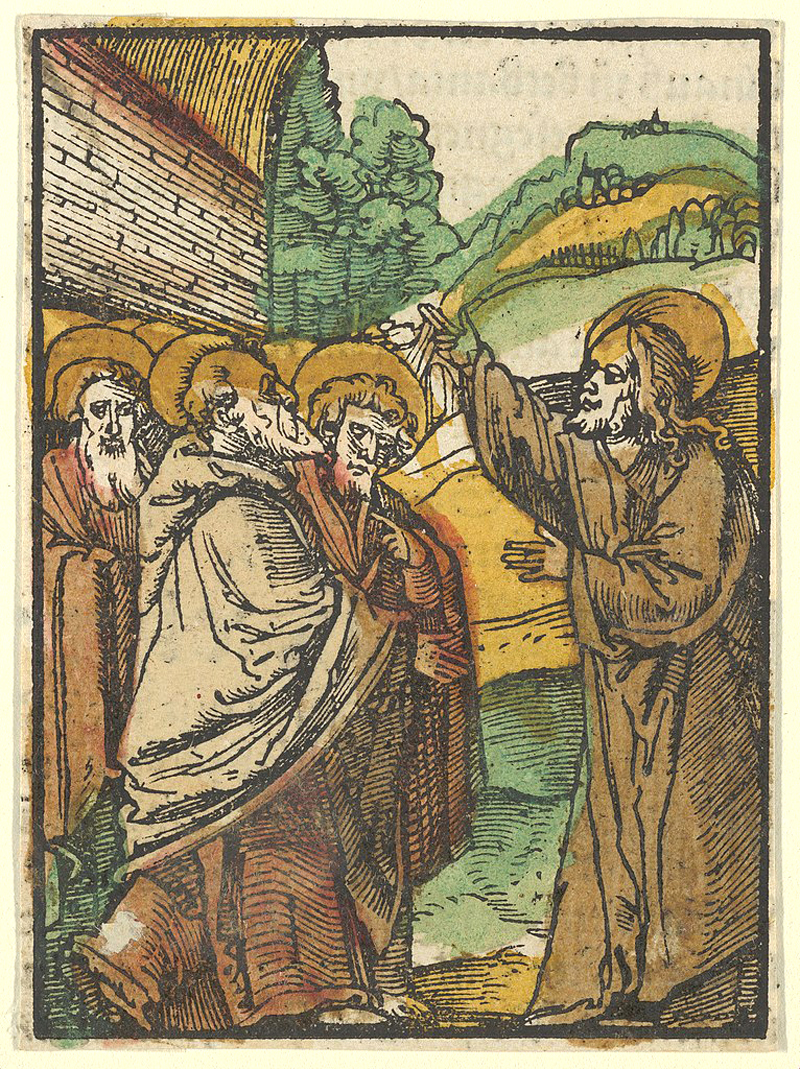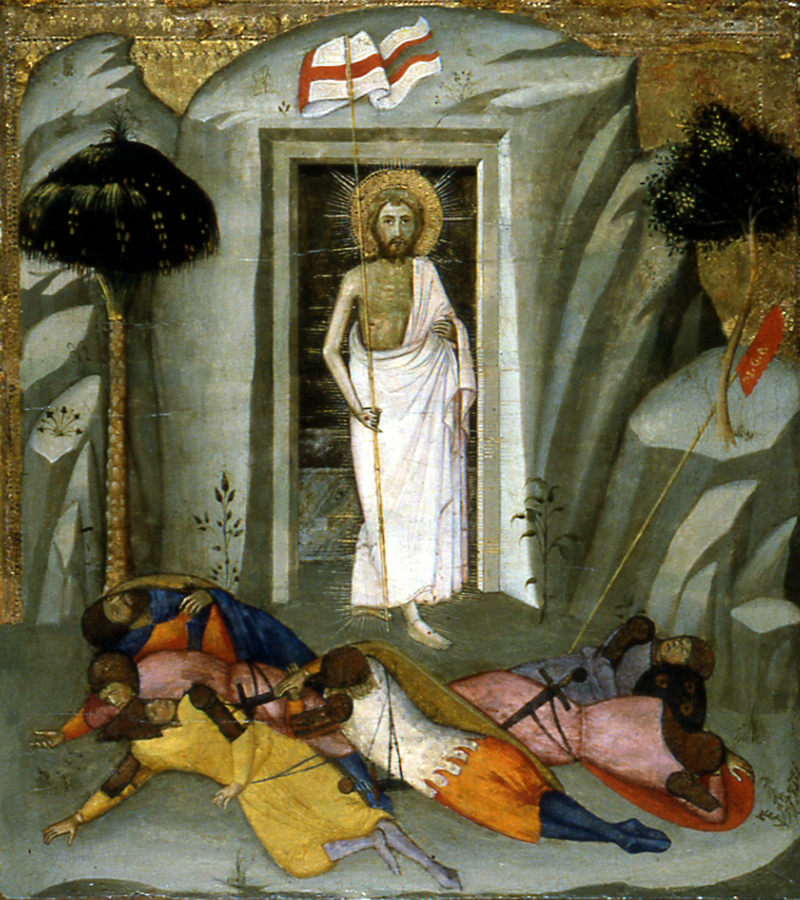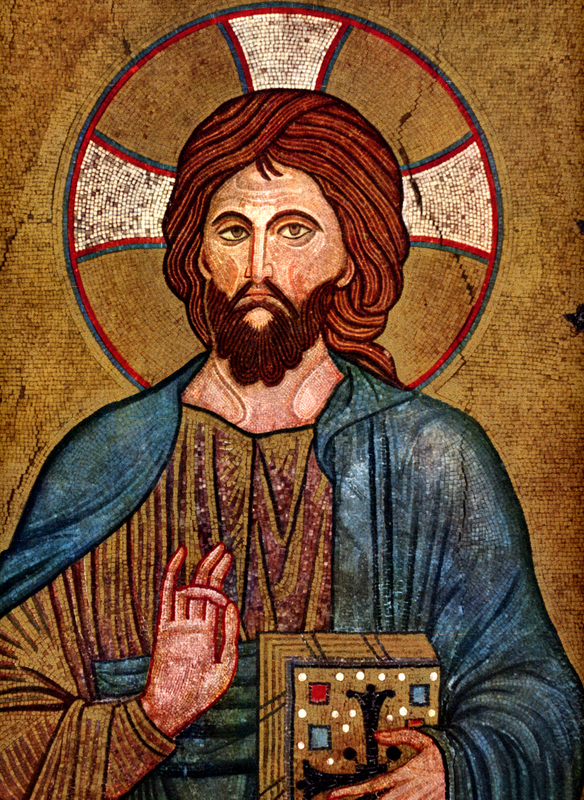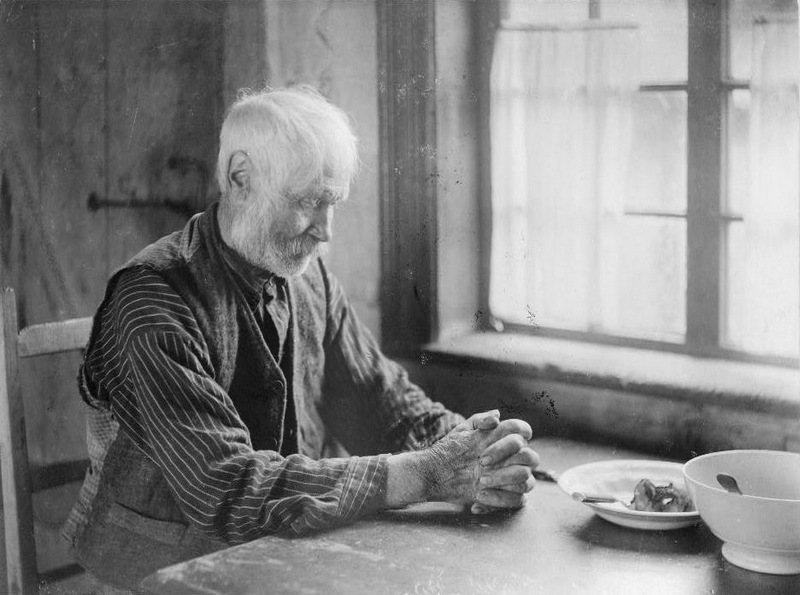
Proper 20b
Mark 9:30-37; Proverbs 31:10-31; Psalm 1; James 3:13 – 4:3, 7-8a
In the beginning part of St. Mark chapter nine, Peter, James, and John saw Jesus transfigured before them. In the next part of the chapter Jesus casts a demon out of a boy. He now picks up again on the strain of teaching that he began in last week’s lectionary reading i.e. he must suffer, die and rise again. In that case St. Peter reproved him and was rebuked. Here they simply do not understand.
In the parallel passage found in Matthew chapter 17 we read, “they were exceedingly sorrowful.” St. Chrysostom poses the question if they were ignorant, how were they be sorry? Because they were not altogether ignorant; that He was soon to die they knew, continually hearing it, but what this death might be, that there would be a speedy release from it, and that it would work innumerable blessings, as yet they knew not clearly; nor what this resurrection might be: but they understood it not, wherefore they grieved.1
Looking back through history the fathers saw the holy catholic church existing from the time of Abel and continuing up to the present. In this light they saw the author of Psalm 1 speaking of the cross, resurrection, the start of the church, and the return of Christ. In the words of Caesarius of Arles,
O blessed cross, which makes people blessed! O cross, from which such great and wonderful fruits are gathered! This fruit of the cross is a glorious resurrection. This fruit of the wood is truly planted “near running water” for baptism is always joined to the cross. However, this wood produced “its fruit in due season,” at the Lord’s resurrection. It will do so again when he appears from heaven, “is seen on earth” and with dazzling sign of the cross.2

The point of the cross is the resurrection and the birth of the Church. Resurrection, in the present, really wasn’t an option that was on the table for the disciples thinking. We remember, Mary and Martha’s reaction in John 11 as the resurrection being something that wouldn’t occur until the final day. Resurrection happening, in the near future, was a concept foreign to their outlook on life.
In Proverbs 31 we have a description of an excellent wife. The Fathers have taken this passage in two ways first as a Christian wife, and secondly as the Church. We will be focusing, in this homily, on the woman as the church.
As we have stated, the resurrection is the birth of the church and is why with proper understanding the cross does not bring sorrow but joy. What do we learn about the Church and Christ’s relationship with her from this passage? “The heart of her husband safely trusts her”, or as in another translation, he has confidence in her. St. Augustin says of this,
He certainly is confident, and he has taught us to be confident too. He commissioned the church, you see, to the ends of the earth, among all nations, from sea to sea. If she was not going to persevere unto the end, her husband’s heart would not be confident about her….So she despoils the world, spread throughout it everywhere; on all sides she plunders trophies from the devils…3
It is amazing. Christ through the resurrection has made the church who she is and because of who she is He has confidence in her. Furthermore, “She brings him profit, not loss, all the days of her life.”, because, “those who live should live no longer for themselves, but for Him who died for them and rose again.” (See II Corinthians 5:15) The Church as a whole, and we individually as part of the Church live only for the cause of Christ.
“She makes tapestry for herself; Her clothing is fine linen and purple.” or to say it another way she has made two garments. She has made these garments the one is of action i.e. of works the other of spirit i.e. of faith. In this way she weaves together faith and works4. Which reminds us of the epistle reading from a few weeks ago in St. James 2. Faith and works must work hand in hand.

Let us turn our attention now to the Psalm reading, which we briefly touched on earlier. The Fathers have, I believe, a unanimous understanding that the principal interpretation of the blessed man is that he is Christ and some secondarily see that man also as the one conformed to Christ. I will be looking at both of these understandings.
Christ is the first of them who rightly are called blessed5. We recognise all who are blessed by the fact that they do not walk in the counsel of the wicked, just as the Psalm says. Didymus the Blind, one of the Fathers, tells us the way of sinners is the devil himself. Let the one who stands in this way be warned lest he tarry there. Recall what the Scripture says: “Resist the devil, and he will flee from you.” For the one who will not stand in the devil’s will come to the Lord, who says, “I am the way.”6 We will look at this more closely when we turn our attention to the epistle reading.
This man meditates on the Scriptures day and night and this meditation produces fruit and leaves and what are these fruit and leaves? The fruit is the orthodox faith that has been passed down to us and it is adorned with the works of virtue. This is the life that not only flows out of meditation as meditation flows out of the resurrection.
Let us now return to the second part of our Gospel reading and take warning. After being told of his impending suffering, death and resurrection, the disciples began to discuss who was the greatest. What of ourselves, do we think so quickly of our own interests after hearing things that are wondrous and ought to respond in praise to God?
However, in His mercy, Jesus bears with them as he does so often with us and explains how to be the greatest. It is by being the last of all and the servant of all. St. Chrysostom tells us, “If you are in love with precedence and the highest honour, pursue the things in last place, pursue being last of all, pursue the lowliest of all, pursue being the smallest of all, pursue placing yourself behind others.”7 Gregory of Nyssa also reminds us that is not just our brothers we are to be subordinate to, but all – friends, enemies etc.8
Wisdom we see is the opposite of what we would expect – the servant of all being the first. We see in the epistle reading that St. James is focusing his attention on those who are wise or, at the very least, are professing to be wise. He points out to us that professing, or verbally teaching is not the proof of good standing with God, but rather the one who lives rightly.
In our own lives, each of us probably can identify a time in our lives when our lips gave a much better profession than our conduct. Our own Metropolitan has testified how he came through a certain season of his life where he was dry on the inside, but at the same time, he was receiving compliments on his messages and prayers. Our life will ultimately be the proof of our standing and not merely our words, just as the tree produces fruit.
Wisdom, of jealousy and selfish ambition, is very accurately described as earthly unspiritual and demonic, for as long as we seek earthly glory, we deprive ourselves of spiritual grace and remain cut off from God. Anything that we do while we are so tainted by a spirit of jealousy and strife will be tainted by evil. No matter how good it looks. Bitterness will seep into everything that we say or do.
Regrettably, I can write from experience. When there is bitterness in our lives, it will at best cloud our judgement of others, but often we will look on others with suspicion. We will compile hurts with perceived hurts until we cannot see the love and grace of not only others, but what is worse we cannot see the love God has for us.
Let us turn our attention to the wisdom from above, the heavenly wisdom. It is pure because it only thinks pure thoughts. It is peaceable because it does not remove itself from others, on account of pride9. How often have I, how often have you, chosen not to speak or spend time with certain people just because of our pride. Once these first two virtues are established in us the remaining ones will flow out of a life of wisdom.
Whether we are righteous, or ungodly, whether we have earthly or heavenly wisdom, we will reap what we sow. If we are righteous, we sow each day our good works, our life of peace and our other actions will sow the seed of the fruit that we will receive in heaven. Conversely, if we are ungodly, our actions will bring us a crop of destruction in eternal punishment.
If we don’t have this wisdom what are we to do? Back in chapter one St. James stated, “If any of you lacks wisdom, let him ask of God, who gives to all liberally and without reproach, and it will be given to him. But let him ask in faith, with no doubting, for he who doubts is like a wave of the sea driven and tossed by the wind. For let not that man suppose that he will receive anything from the Lord; he is a double-minded man, unstable in all his ways.”

Here, we have an example of asking and not receiving. Why is this? Again: Didymus the Blind has addressed this problem albeit from another passage. Let us listen to his words,
The Saviour said, “Ask and you will receive. Everyone who asks will receive.” How can it be that some people pray but do not get what they ask for? To this it must be answered that if someone comes to prayer in the right way, omitting none of the prerequisites for intercession, he will receive everything that he asks for. But if someone appears to be going beyond the permissible bounds laid down for intercession, he will appear to be asking for something in the wrong way and therefore will not obtain it.10
In the Psalms, we read, “Had I cherished evil in my heart, the Lord would not have heard.” and here we see that prayers will not be answered if our motives are incorrect. These are but two of the prerequisites. If our prayers are not being answered, we must search the Scriptures to see why. If we come to prayer with a pure heart, desiring the best for others, God will hear our prayer. As St. Didymus points out, we will receive everything that we ask for.
Finally, St. James instructs us to submit to God and the devil will flee from us. Death came into the world through the spite and malice of the devil. Christ lives and dwells in us in the inner man. The very reason he chose to do so was to drive out the death that the devil had placed in us through his cunning. He came to bring us life and bring it more abundantly. It is God’s desire to expel every remnant of the devil and his works (including his wisdom) from our lives. The devil is defeated and has no power over us. The Shepherd of Hermas, whose works were considered for canonisation, instructs us, “fear not the devil; for, fearing the Lord you will have dominion over the devil, for there is no power in him [the devil]…Fear, therefore, the deeds of the devil, since they are wicked. For fearing the Lord, you will not do these deeds, but will refrain from them.”11
Now, let us examine ourselves. Do we give thanks for God’s wondrous deeds and plans when we hear them or do we turn our attention to ourselves? Are we seeking to place ourselves before others or are we serving them? If our words are not matching our lifestyle let us repent and ask God to change us. If there are remnants of demonic wisdom in our lives, let us renounce them, submit to God, resist the devil and draw near to God. Then, let us ask of God wisdom, as we read earlier he has promised to give it to those who have asked. In humility and repentance we can be assured that God will grant it to us.
Dn. Fr. Matthew
1 Philip Schaff, D.D., LL.D Editor, Nicene and Post-Nicene Fathers, First Series Volume 10, Chrysostom: Homilies on the Gospel of Saint Matthew, originally published in the United States by the Christian Literature Publishing Company, 1889 (Peabody, MA: Hendrickoson Publishing Marketing, LLC), 358
2 Craig A. Blaising, Carmen S. Hardin and Thomas C. Oden Editors, Ancient Christian Commentary on Scripture Old Testament VII (Downers Grove, IL: InterVarsity Press, 2008), 9
3 J. Robert Wright and Thomas C. Oden Editors, Ancient Christian Commentary on Scripture Old Testament IX (Downers Grove, IL: InterVarsity Press, 2005), 186-187
4 J. Robert Wright and Thomas C. Oden Editors, Ancient Christian Commentary on Scripture Old Testament IX (Downers Grove, IL: InterVarsity Press, 2005), 188
5 Craig A. Blaising, Carmen S. Hardin and Thomas C. Oden Editors, Ancient Christian Commentary on Scripture Old Testament VII (Downers Grove, IL: InterVarsity Press, 2008), 3
6 Craig A. Blaising, Carmen S. Hardin and Thomas C. Oden Editors, Ancient Christian Commentary on Scripture Old Testament VII (Downers Grove, IL: InterVarsity Press, 2008), 5
7 Christopher A. Hall and Thomas C. Oden, Ancient Christian Commentary on Scripture New Testament II (Downers Grove, IL: InterVarsity Press, 1998), 120
8 ibid.
9 Gerald Bray and Thomas C. Oden, Ancient Christian Commentary on Scripture New Testament XI (Downers Grove, IL: InterVarsity Press, 2000), 43
10 Gerald Bray and Thomas C. Oden, Ancient Christian Commentary on Scripture New Testament XI (Downers Grove, IL: InterVarsity Press, 2000), 46
11 Alexander Roberts, D.D., and James Donaldson, LL.D Editors, Ante-Nicene Fathers, Volume 2, Hermas, Tatian, Athenagoras, Theophilus, Clement of Alexandria, originally published in the United States by the Christian Literature Publishing Company, 1885 (Peabody, MA: Hendrickoson Publishing Marketing, LLC), 24-25
Schäufelein, Hans Leonhard. Christ Teaching the Disciples, from Art in the Christian Tradition, a project of the Vanderbilt Divinity Library, Nashville, TN.http://diglib.library.vanderbilt.edu/act-imagelink.pl?RC=56624 [retrieved September 25, 2018]. Original source: https://commons.wikimedia.org/wiki/File:Christ_Teaching_the_Disciples,_2,_from_Das_Plenarium_MET_DP849939.jpg – Adam Petri.
Bartolo, Andrea di, -1428. Resurrection of Christ, from Art in the Christian Tradition, a project of the Vanderbilt Divinity Library, Nashville, TN.http://diglib.library.vanderbilt.edu/act-imagelink.pl?RC=55333 [retrieved September 26, 2018]. Original source: http://commons.wikimedia.org/wiki/File:Andrea_di_Bartolo_-_The_Resurrection_-_Walters_37741.jpg.
Pantocrator – Christ, from Art in the Christian Tradition, a project of the Vanderbilt Divinity Library, Nashville, TN. http://diglib.library.vanderbilt.edu/act-imagelink.pl?RC=46172 [retrieved September 26, 2018].
Eickemeyer, Rudolf, 1862-1932. Give Us This Day Our Daily Bread, from Art in the Christian Tradition, a project of the Vanderbilt Divinity Library, Nashville, TN.http://diglib.library.vanderbilt.edu/act-imagelink.pl?RC=55501 [retrieved September 26, 2018]. Original source: http://commons.wikimedia.org/wiki/File:Give-us-this-day-our-daily-bread-reickemeyer.jpg.